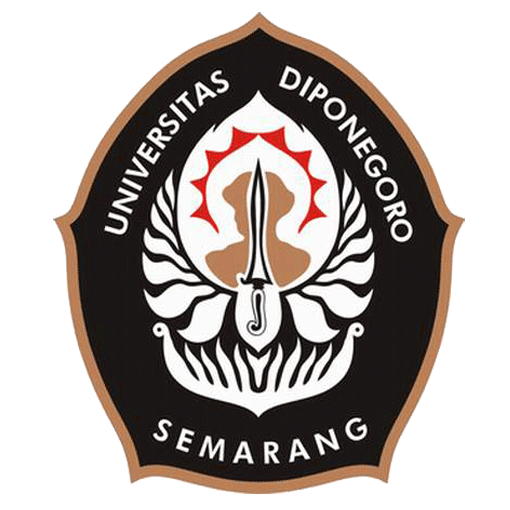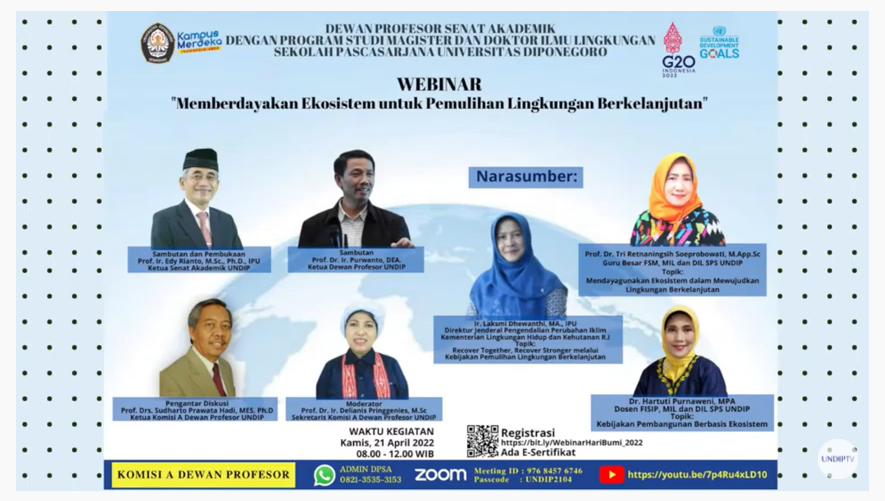Commission A of the Professors Council of the Academic Senate (DP-SA) in collaboration with the Environmental Sciences Master Program (MIL) and Environmental Sciences Doctoral Program (DIL) of Postgraduate School of Diponegoro University held a Webinar with the theme “Empowering Ecosystems for Sustainable Environmental Recovery”, on Thursday (21/4).
Present as resource person were Ir. Laksmi Dhewanthi, MA., IPU (Director General of Climate Change Control, Ministry of Environment and Forestry), Prof. Dr. Tri Retnaningsih Soeprobowati, MAppSc (Professor of Faculty of Science and Mathematics, MIL and DIL SPS Diponegoro University), Dr. Hartuti Purnaweni, MPA (Lecturer of Faculty of Social and Political Sciences, MIL and DIL SPS Diponegoro University). The moderator of the event was Prof. Dr. Ir. Delianis Prenggenies, M.Sc (Secretary of Commission A Undip Professors Council).
In her material entitled “Recover Together Recover Stronger: Sustainable Environmental Recovery Policy”, Laksmi Dhewanthi conveyed the milestones development of the Ministry of Environment and Forestry to deliver the role and maintain sustainable development. In 2020, adaptation in the midst of a pandemic and continuing to oversee changing times, in 2021 increasing social capital and strengthening the positive performance of the Ministry of Environment and Forestry, and in 2022 strengthening the contribution of the site to national economic recovery and structural reforms.
“We encourage nature tourism as an instrument to advance the area, such as Tanjung Puting National Park where tourists can walk along the Sekonyer River to enjoy the beauty of tropical nature to Camp Leakey for trekking and seeing orangutans. Meanwhile, in Manupeu Tanadaru-Laiwangi Wanggameti National Park, the flow of water in Wanggameti Village also drives micro hydro turbines that illuminate 36 houses and public facilities every day for 24 hours. In Mahaniwa Village, 80 houses are illuminated, including public facilities. Before the existence of PLTMH, the two villages were pitch black when the sun went down. Economic benefits for the people of Sumba are generated from merchandise in the form of traditional fabrics, scarves and others,” she said.
Furthermore, she said that community directly involve in forest and land fire prevention efforts, includes forming a fire-caring community that has the task of preventing forest from land fires, carrying out early extinguishing and supporting extinguishers carried out by Manggala Agni and/or other parties, increasing public awareness in their village related to forest and land fires and/or adaptation and mitigation efforts to climate change, identifying climate change adaptation and mitigation efforts, proposing prospective ProKlim locations, providing information related to forest and land fires events, disseminating information on forest and land fire hazard ratings, conducting counseling independently or together with other parties, and holding regular meetings in the context of institutional strengthening.
Next, Prof. Dr. Tri Retnaningsih Soeprobowati, MAppSc explained the ecosystem as an ecological system formed by the inseparable reciprocal relationship between living things and their environment, both living and nonliving.
“Ecosystem services are ecosystem benefits that can be used for human life which include supply services, regulatory services, and socio-cultural services. The Economics of Ecosystem and Biodiversity agrees that environmental services are defined as the direct and indirect contribution of ecosystem structure and function to human welfare,” she said.
Dr. Hartuti Purnaweni discussed the “Ecosystem-Based Development Policy”. According to her, the transformation in environmental development, disaster resilience, and climate change is focused on efforts to improve the quality of the environment through handling B3 waste, increasing environmental quality monitoring, improving the disaster resilience system that is responsive to sudden and slow onset disasters, as well as the implementation of development that results in low-GHG emission economic growth.
“The benefits of ecosystems are healthy forests, coasts, seas, and wetlands for local communities, such as clean water, protection and food as well as physical protection against various threats from nature such as erosion, abrasion, and landslides. Soil and vegetation absorb rainwater and prevent evaporation into the air. Biodiversity supports the services provided by ecosystems and well-preserved biodiversity will strengthen resilience and reduce disaster risk,” she explained. (Lin – Public Relations)

